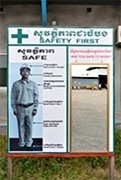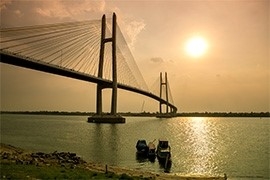Official Development Assistance (ODA)
Quality Infrastructure
Quality Infrastructure Investment
 Photo provided by JICA
Photo provided by JICA
 Photo provided by JICA
Photo provided by JICA
- Quality Infrastructure Investment
- Japan's Action
- References
- Links
Overview
The self-reliant development of developing countries requires infrastructure such as water and sewage, roads, and power plants that forms the foundation of growth, and supports economic activities and people’s life. However, huge demand for infrastructure in developing countries is still growing, and the investment gap by 2040 is estimated approximately $15 trillion (according to the G20 Global Infrastructure Hub [GIH]).
Enormous demand for infrastructure must be met to fill the gap. However, responding to the demand merely in terms of quantity is not sufficient to achieve "quality growth" that is inclusive, sustainable, and resilient. For example, infrastructure projects that require relatively low initial cost may seem attractive for countries under financial constraints. Nevertheless, these projects may end up impeding the growth of developing countries, if they have the following issues: being incapable of delivering value for money due to closed and non-transparent procurement of infrastructure; lacking economic efficiency in view of entire life-cycle cost due to enormous operational and management costs; and defaulting due to unfeasible medium- and long-term repayment plans.
In other words, it is important to consider not only quantity but also quality of infrastructure, such as transparency, openness, economic efficiency in view of life-cycle cost, and debt sustainability to achieve "quality growth" in developing countries.
In line with these viewpoints above, Japan has been working with the international community to disseminate the notion of "quality infrastructure," with the aim of international standardization of it so that more people will have access.
The initial step of sharing the fundamental elements of "quality infrastructure investment" was the "G7 Ise-Shima Principles for Promoting Quality Infrastructure Investment, " endorsed at the G7 Ise-Shima Summit (Ise-Shima Summit [May 2016]) under the Japanese Presidency in 2016 (English [PDF] / Japanese Provisional Translation [PDF]
/ Japanese Provisional Translation [PDF] ). The importance of these principles has been reiterated at many international conferences, including the G20 Hangzhou Summit. Furthermore, the "G20 Principles for Quality Infrastructure Investment" (English [PDF]
). The importance of these principles has been reiterated at many international conferences, including the G20 Hangzhou Summit. Furthermore, the "G20 Principles for Quality Infrastructure Investment" (English [PDF] / Japanese Provisional Translation [PDF]
/ Japanese Provisional Translation [PDF] ) were endorsed by the G20 countries including emerging donor countries, at the G20 Osaka Summit (G20 Osaka Summit [June 2019]) under the Japanese Presidency in June 2019.
) were endorsed by the G20 countries including emerging donor countries, at the G20 Osaka Summit (G20 Osaka Summit [June 2019]) under the Japanese Presidency in June 2019.
Japan will continue to work with the international community, including the Organization for Economic Co-operation and Development (OECD) and the EU, to further promote international standardization of quality infrastructure investment.
At the same time, Japan has contributed to implementing quality infrastructure investment that facilitates the growth of developing countries by utilizing its advanced technologies. For detailed information of Japan’s efforts on individual projects, please follow the link below.
What is Quality Infrastructure?
"Quality infrastructure" is "resilient," against natural disasters and other risks, "inclusive," leaving no one behind, and "sustainable," taking into account its impact on society and the environment. In order to achieve quality infrastructure investment, the "G20 Principles for Quality Infrastructure Investment" were drafted in the G20 process in 2019, and endorsed at the Osaka Summit in June of the same year. These principles include the following:
- Openness and Transparency
Openness and transparency of procurement should be secured to ensure that infrastructure projects are value for money. From the viewpoint of achieving inclusive growth, the management of infrastructure after construction should be transparent and all users should have equal access. - Economic Efficiency in view of Life-Cycle Cost
To achieve sustainable growth, economic efficiency should be ensured by taking full account of the economic and social impacts and cost-benefit performance. Besides the initial investment on the infrastructure construction, the total cost over its life-cycle should also be considered, including its management as well as its operation and maintenance (O&M), resilience to natural disasters, environmental considerations, etc. - Debt Sustainability
In addition to project-level financial sustainability, the macro-level debt sustainability of countries where projects are operated should also be considered in a transparent manner.
Key Conferences and Events Related to Quality Infrastructure Investment
G7 Ise-Shima Summit (May 2016)
At the G7 Ise-Shima Summit held in 2016, the G7 member countries reached a consensus on the idea that it is important for the international community to share the view regarding the fundamental elements of "quality infrastructure investment." To that end, the G7 members agreed on the "G7 Ise-Shima Principles for Promoting Quality Infrastructure Investment" (English [PDF] / Japanese Provisional Translation [PDF]
/ Japanese Provisional Translation [PDF] ). The G7 members confirmed to disseminate the Principles to other countries and international organizations, etc., and to encourage them to act in line with the Principles when providing infrastructure investment and support. Japan also launched the “Expanded Partnership for Quality Infrastructure”.
). The G7 members confirmed to disseminate the Principles to other countries and international organizations, etc., and to encourage them to act in line with the Principles when providing infrastructure investment and support. Japan also launched the “Expanded Partnership for Quality Infrastructure”.
G20 Osaka Summit (June 2019)
The G20 Osaka Summit was held under the Japanese Presidency for the first time in 2019. At the summit, all the members of the G20—including emerging donor countries—endorsed the "G20 Principles for Quality Infrastructure Investment" (English [PDF] / Japanese Provisional Translation [PDF]
/ Japanese Provisional Translation [PDF] ), as their common strategic direction and high aspirations toward quality infrastructure investment in the future. These principles include elements such as openness, transparency, economic efficiency, and debt sustainability. Japan will cooperate with the international community to disseminate and implement them in individual projects. Furthermore, Japan will also continue to support capacity building to implement the principles in developing countries, and assist them with achieving sustainable and inclusive economic growth.
), as their common strategic direction and high aspirations toward quality infrastructure investment in the future. These principles include elements such as openness, transparency, economic efficiency, and debt sustainability. Japan will cooperate with the international community to disseminate and implement them in individual projects. Furthermore, Japan will also continue to support capacity building to implement the principles in developing countries, and assist them with achieving sustainable and inclusive economic growth.

